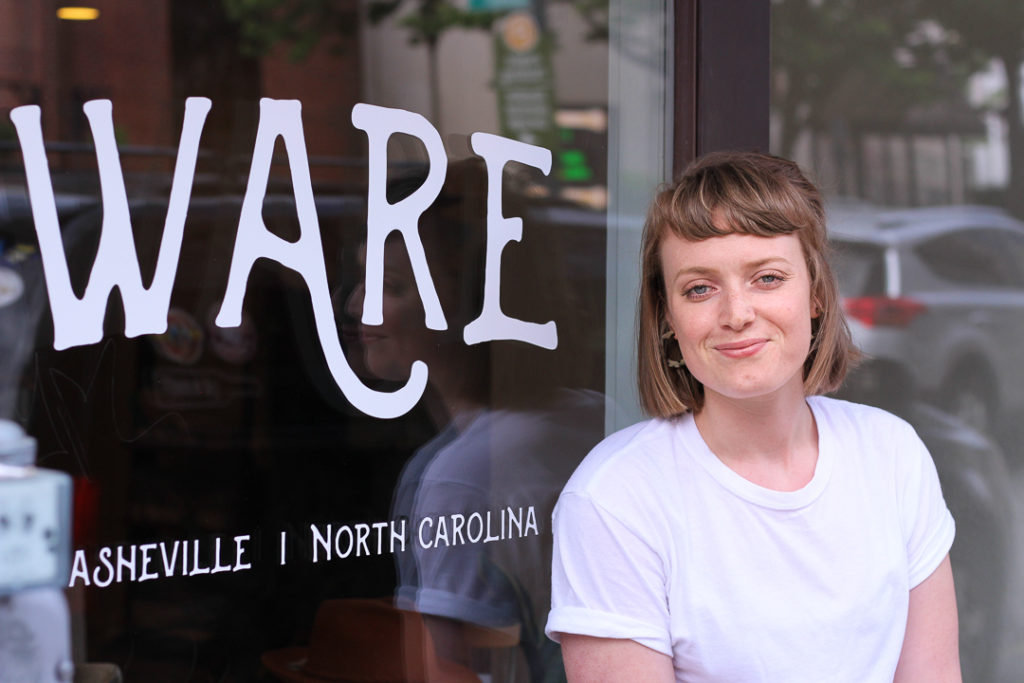“If the goal is sales, that can be good in the short term but long-term success is very much based on trust.”
Our most engaging post on Instagram—by a landslide— is a picture of a 5” by 2” piece of paper. In sharing that picture, we started to unpack what we consider the single best marketing strategy that any business can undertake. It costs nothing and yet it pays dividends over time.
We call it “The Trusted Advisor Theory.”

But First, More On That Piece of Paper
This small piece of paper we shared contains a curated list East Fork Pottery’s favorite restaurants, bars, breweries, and activities in Asheville. It even includes other favorite potters in the city. We picked it up at their shop on North Lexington.
To be clear, this isn’t just any list. As many of you know, East Fork is an Asheville institution—a well-known pottery brand now famous throughout the country. As far as brands go, they’re about as big as it gets in Asheville. They’ve been featured in Bon Appétit, Fast Company, the New York Times, and many other publications.
While they make their goods in Asheville, they’re not just making it in Asheville. They’re making it everywhere.
So then, why bother to give out a list of their favorite coffee shops, and even more shockingly, other pottery makers in town? Why send people away from their shop to other stores in town to their competition?
Why It’s Not Always About the Sale
“I’m not a very good salesperson. I often send people away to other companies,” says Gillie Roberts, owner of Ware, a sustainable lifestyle shop called in Downtown Asheville. “I’ll say to them ‘Here’s the exact thing you need, I don’t carry it for XYZ but this is what you need.’”
She continued, “If the goal is sales, that can be good in the short term but long-term success is very much based on trust.”
(P.S. We interviewed Gillie in podcast Episode 004. You can listen to the full episode and review the show notes here.)

There’s a valuable business lesson in Gillie’s words. We’ll bet that you’ve experienced a pushy salesperson who attempts to pressure you into buying something. How did you feel after that exchange? Pushy salespeople make us feel less trusting of that person and what they’re selling.
On the other hand, there’s no better way to build trust when someone makes an honest recommendation.
When we were brand new to town (not that we aren’t still—but this story was from our first weekend in Asheville), we stopped in Old North and got to speak with Jack, the owner, and Kylie, the manager. We didn’t buy anything that day and they didn’t pressure us to even look around. Instead with left with a list of their favorite restaurants and bars, written on the back of receipt paper. Every recommendation they gave has been amazing. When it’s time to buy a new pair of jeans, guess where Tony is going?
Whether they were aware of it or not, whether it’s part of an explicitly communicated strategy or not, East Fork, Old North, and Ware are positioned to be our Trusted Advisors.
We know you’ve experienced this as well.
On a small scale, it happens almost every time you dine out at a restaurant. How do you feel when you go to a restaurant and the server ‘recommends’ the most expensive items on the menu? While it might be true that, yes, the $62 filet mignon is a delicious dish, it also might be true that the waiter is simply trying to raise the bill to get a bigger tip. It’s always much more believable, and endearing when they tell you what not to order and then recommends their true favorite and explains why.
While becoming a Trusted Advisor doesn’t often happen overnight, it is a valuable strategy. And it’s accessible to you and to every business out there, no matter how small or large.
The Path to Becoming a Trusted Advisor
So how can you practice this paradoxical wisdom in your daily life and business?
“[Trust] is not something that happens immediately,” Gillie says. During the episode, she goes on to reference Brené Brown’s wise words: “Trust is built in small moments.”
In other words: it takes time and you can expect to gain trust in baby steps. It’s uncommon to get someone to trust you in one fell swoop. You have to put in the work every day.
But how? We sat down and meditated on this concept and came up with a few beliefs on how to build trust in business. We’re no gurus, these are just hypotheses. In fact, over the next month, we’re going to test these out and see how they work for us. We challenge you to do the same.
Our 7 Truths of Trust Building
1. Share what you love.
If there’s someone you follow on social that you absolutely love, chances are your followers probably will too. Social media, especially Instagram, is a wonderful branding platform. It’s not necessarily designed to drive sales but rather tell your brand story and build relationships with others. So, sharing a post from a fellow like-minded business —even if it’s not directly related to your business or, on the other hand, even if it’s from an account that some might consider competition —is generally appreciated by your fans. And, in the end, it’s about serving your fans.
By the way —this isn’t limited to social media. Sharing an article, newspaper clipping, quote from a book, or photo with a friend by email or a handwritten letter. We’re giving social media as the example because it’s the primary sharing tool we all use these days, but this practice could take many different forms.
2. Identify when you’re not the right fit.
When a customer comes in looking for something that you just don’t have or do, be honest. While there’s a time and a place to expand your offerings to fulfill a client’s needs, chances are you’ll end up feeling icky if you sell them a square peg for their round whole. Most of the time, it’s best to know what you do best and only focus on doing that.
3. Send people away.
Yup. Send them away. If you’re not the right fit, admit it and then attempt to solve their problem by knowing who is. Recommend that they try a different store, product, or company that fulfills their needs. While there is a small chance that they might not ever come back, there’s a higher likelihood that they will or that they will recommend your brand to someone else — someone who needs square pegs.
4. Give away what you know.
Giving away something for free and not asking for anything in return is a great way to build trust. Also, knowledge and information are rapidly becoming free. If you think you’re in business because of what you know, we beg you to reconsider. People can Google/Wikipedia/YouTube search for the info. What they want is someone who knows how to save the day.
So think about it: what do you know that your customers might want to know, too? Knowing that many of their customers visit their Asheville store from out of town, East Fork built a curated list of their favorite things to do in Asheville. It helps their customers and is aligned with their own brand ethos which is to support small, local businesses.
5. Deliver on your promises.
Be accountable. Do what you say you’re going to do and do it on time. It should go without saying, but the truth is if you don’t deliver on your promise, you’ll lose trust. Trust is like a reputation and as they say, “reputation takes a lifetime to build a minute to blow.”
6. Only speak positively.
Applied to a business sense, we mean don’t talk $#*! about your customers, your competitors, or your partners. One of the most cringeworthy mistakes we see here in Asheville is people talking down on businesses or competitors they don’t particularly like. The truth is we all have our favorites and our non-favorites. Share your favorites and keep your non-favorites to yourself!
One of the best Reddit life-hacks we’ve heard is to only speak positively behind people’s backs at work because eventually, everyone will assume you talk positively about them behind their backs as well. That sounds like a great plan to us.
7. Be real.
People can smell imposters a mile away. Speaking of which, avoid hyperboles when talking about your brand. Be yourself and talk about your business openly and honestly. Saying something like “We’re the best ice cream in town!” is a lot less compelling and trustworthy than “While there are many great ice creams in town, ours is different because we use XYZ.” There’s a happy medium between wanting people to be as excited for your product as you are and being real. We think it’s based on finding what makes you or your product unique and why that can matter to the right people.
Over the next month, we’ll be leaning into these themes and testing out our assumptions. We’ll report back in a month or so on the results so, stay tuned, friend.
Now, enough of us blabbering. What do you think? What makes you trust a business? How are you working to be a trusted advisor yourself? Let us know in a message! Email us or send us a DM on Instagram.


Trackbacks & Pingbacks
[…] are a few of Connie’s favorite places to hang out at in Asheville (among many others on the East Fork Recommends list we mentioned in our Trusted Advisor Theory blog […]
[…] In this episode, we dive deeper into a topic we’ve been talking a lot about recently: The Trusted Advisor Theory. […]
Comments are closed.